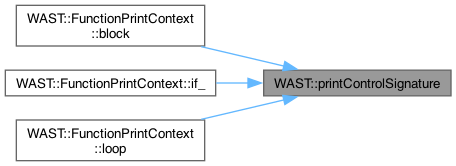Classes | |
| struct | Action |
| struct | ActionCommand |
| struct | AssertInvalidOrMalformedCommand |
| struct | AssertReturnCommand |
| struct | AssertReturnNaNCommand |
| struct | AssertTrapCommand |
| struct | AssertUnlinkableCommand |
| struct | Command |
| struct | Error |
| struct | FatalParseException |
| struct | FunctionPrintContext |
| struct | GetAction |
| struct | InvokeAction |
| struct | LineInfo |
| struct | ModuleAction |
| struct | ModuleParseState |
| struct | ModulePrintContext |
| struct | Name |
| struct | NameScope |
| struct | ParseState |
| struct | RecoverParseException |
| struct | Reference |
| struct | RegisterCommand |
| struct | ScopedTagPrinter |
| struct | StaticData |
| struct | TextFileLocus |
| struct | UnresolvedError |
| struct | UnresolvedFunctionType |
Typedefs | |
| typedef std::unordered_map< Name, U32, Name::Hasher > | NameToIndexMap |
Enumerations | |
| enum class | ActionType { _module , invoke , get } |
| enum | TokenType : U16 { numTokenTypes } |
Functions | |
| WAST_API void | parseTestCommands (const char *string, Uptr stringLength, std::vector< std::unique_ptr< Command > > &outTestCommands, std::vector< Error > &outErrors) |
| WAST_API bool | parseModule (const char *string, Uptr stringLength, IR::Module &outModule, std::vector< Error > &outErrors) |
| WAST_API std::string | print (const IR::Module &module) |
| const char * | describeToken (TokenType tokenType) |
| bool | isRecoveryPointChar (char c) |
| Token * | lex (const char *string, Uptr stringLength, LineInfo *&outLineInfo) |
| void | freeTokens (Token *tokens) |
| void | freeLineInfo (LineInfo *lineInfo) |
| TextFileLocus | calcLocusFromOffset (const char *string, const LineInfo *lineInfo, Uptr charOffset) |
| PACKED_STRUCT (struct Token { TokenType type;U32 begin;}) | |
| void | findClosingParenthesis (ParseState &state, const Token *openingParenthesisToken) |
| void | parseErrorf (ParseState &state, Uptr charOffset, const char *messageFormat, va_list messageArguments) |
| void | parseErrorf (ParseState &state, Uptr charOffset, const char *messageFormat,...) |
| void | parseErrorf (ParseState &state, const char *nextChar, const char *messageFormat,...) |
| void | parseErrorf (ParseState &state, const Token *nextToken, const char *messageFormat,...) |
| void | require (ParseState &state, TokenType type) |
| bool | tryParseValueType (ParseState &state, ValueType &outValueType) |
| bool | tryParseResultType (ParseState &state, ResultType &outResultType) |
| ValueType | parseValueType (ParseState &state) |
| const FunctionType * | parseFunctionType (ModuleParseState &state, NameToIndexMap &outLocalNameToIndexMap, std::vector< std::string > &outLocalDisassemblyNames) |
| UnresolvedFunctionType | parseFunctionTypeRefAndOrDecl (ModuleParseState &state, NameToIndexMap &outLocalNameToIndexMap, std::vector< std::string > &outLocalDisassemblyNames) |
| IndexedFunctionType | resolveFunctionType (ModuleParseState &state, const UnresolvedFunctionType &unresolvedType) |
| IndexedFunctionType | getUniqueFunctionTypeIndex (ModuleParseState &state, const FunctionType *functionType) |
| bool | tryParseName (ParseState &state, Name &outName) |
| bool | tryParseNameOrIndexRef (ParseState &state, Reference &outRef) |
| U32 | parseAndResolveNameOrIndexRef (ParseState &state, const NameToIndexMap &nameToIndexMap, Uptr maxIndex, const char *context) |
| void | bindName (ParseState &state, NameToIndexMap &nameToIndexMap, const Name &name, Uptr index) |
| U32 | resolveRef (ParseState &state, const NameToIndexMap &nameToIndexMap, Uptr maxIndex, const Reference &ref) |
| bool | tryParseHexit (const char *&nextChar, U8 &outValue) |
| bool | tryParseString (ParseState &state, std::string &outString) |
| std::string | parseUTF8String (ParseState &state) |
| bool | tryParseI32 (ParseState &state, U32 &outI32) |
| bool | tryParseI64 (ParseState &state, U64 &outI64) |
| U8 | parseI8 (ParseState &state) |
| U32 | parseI32 (ParseState &state) |
| U64 | parseI64 (ParseState &state) |
| F32 | parseF32 (ParseState &state) |
| F64 | parseF64 (ParseState &state) |
| IR::FunctionDef | parseFunctionDef (ModuleParseState &state, const Token *funcToken) |
| void | parseModuleBody (ModuleParseState &state) |
| char | nibbleToHexChar (U8 value) |
| std::string | escapeString (const char *string, Uptr numChars) |
| std::string | expandIndentation (std::string &&inString, U8 spacesPerIndentLevel=2) |
| void | print (std::string &string, ValueType type) |
| void | print (std::string &string, ResultType type) |
| void | print (std::string &string, const SizeConstraints &size) |
| void | print (std::string &string, const FunctionType *functionType) |
| void | print (std::string &string, const TableType &type) |
| void | print (std::string &string, const MemoryType &type) |
| void | print (std::string &string, GlobalType type) |
| void | printControlSignature (std::string &string, ResultType resultType) |
| template<typename Type > | |
| void | printImportType (std::string &string, const Module &module, Type type) |
| template<> | |
| void | printImportType< IndexedFunctionType > (std::string &string, const Module &module, IndexedFunctionType type) |
| template<typename Type > | |
| void | printImport (std::string &string, const Module &module, const Import< Type > &import, Uptr importIndex, const char *name, const char *typeTag) |
Typedef Documentation
◆ NameToIndexMap
| typedef std::unordered_map<Name,U32,Name::Hasher> WAST::NameToIndexMap |
Enumeration Type Documentation
◆ ActionType
|
strong |
| Enumerator | |
|---|---|
| _module | |
| invoke | |
| get | |
Definition at line 41 of file TestScript.h.
◆ TokenType
| enum WAST::TokenType : U16 |
| Enumerator | |
|---|---|
| numTokenTypes | |
Definition at line 87 of file Lexer.h.
Function Documentation
◆ bindName()
| void WAST::bindName | ( | ParseState & | state, |
| NameToIndexMap & | nameToIndexMap, | ||
| const Name & | name, | ||
| Uptr | index ) |
Definition at line 322 of file Parse.cpp.


◆ calcLocusFromOffset()
| TextFileLocus WAST::calcLocusFromOffset | ( | const char * | string, |
| const LineInfo * | lineInfo, | ||
| Uptr | charOffset ) |
Definition at line 331 of file Lexer.cpp.

◆ describeToken()
| const char * WAST::describeToken | ( | TokenType | tokenType | ) |
Definition at line 14 of file Lexer.cpp.

◆ escapeString()
| std::string WAST::escapeString | ( | const char * | string, |
| Uptr | numChars ) |
Definition at line 18 of file Print.cpp.


◆ expandIndentation()
| std::string WAST::expandIndentation | ( | std::string && | inString, |
| U8 | spacesPerIndentLevel = 2 ) |
Definition at line 38 of file Print.cpp.
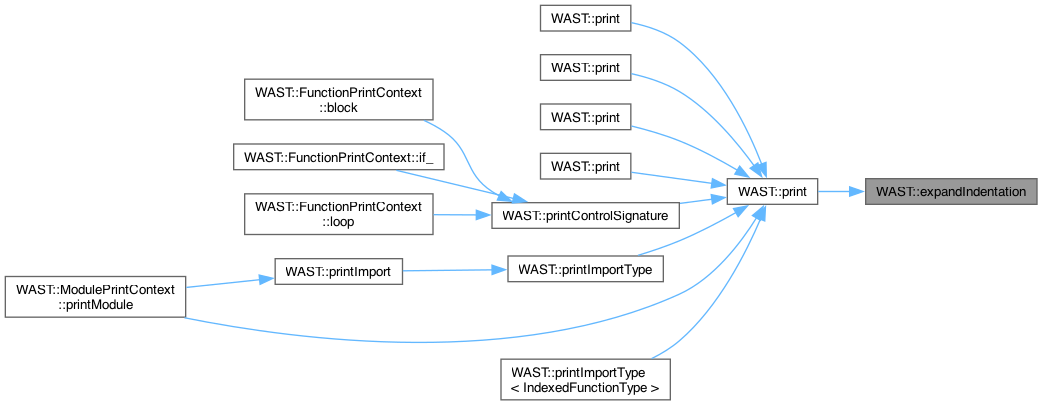
◆ findClosingParenthesis()
| void WAST::findClosingParenthesis | ( | ParseState & | state, |
| const Token * | openingParenthesisToken ) |
Definition at line 19 of file Parse.cpp.


◆ freeLineInfo()
| void WAST::freeLineInfo | ( | LineInfo * | lineInfo | ) |
◆ freeTokens()
| void WAST::freeTokens | ( | Token * | tokens | ) |
◆ getUniqueFunctionTypeIndex()
| IR::IndexedFunctionType WAST::getUniqueFunctionTypeIndex | ( | ModuleParseState & | state, |
| const FunctionType * | functionType ) |
Definition at line 226 of file Parse.cpp.

◆ isRecoveryPointChar()
|
inline |
Definition at line 153 of file Lexer.cpp.

◆ lex()
Definition at line 166 of file Lexer.cpp.


◆ nibbleToHexChar()
| char WAST::nibbleToHexChar | ( | U8 | value | ) |
◆ PACKED_STRUCT()
◆ parseAndResolveNameOrIndexRef()
| U32 WAST::parseAndResolveNameOrIndexRef | ( | ParseState & | state, |
| const NameToIndexMap & | nameToIndexMap, | ||
| Uptr | maxIndex, | ||
| const char * | context ) |
Definition at line 295 of file Parse.cpp.

◆ parseErrorf() [1/4]
| void WAST::parseErrorf | ( | ParseState & | state, |
| const char * | nextChar, | ||
| const char * | messageFormat, | ||
| ... ) |
◆ parseErrorf() [2/4]
| void WAST::parseErrorf | ( | ParseState & | state, |
| const Token * | nextToken, | ||
| const char * | messageFormat, | ||
| ... ) |
◆ parseErrorf() [3/4]
| void WAST::parseErrorf | ( | ParseState & | state, |
| Uptr | charOffset, | ||
| const char * | messageFormat, | ||
| va_list | messageArguments ) |
Definition at line 45 of file Parse.cpp.

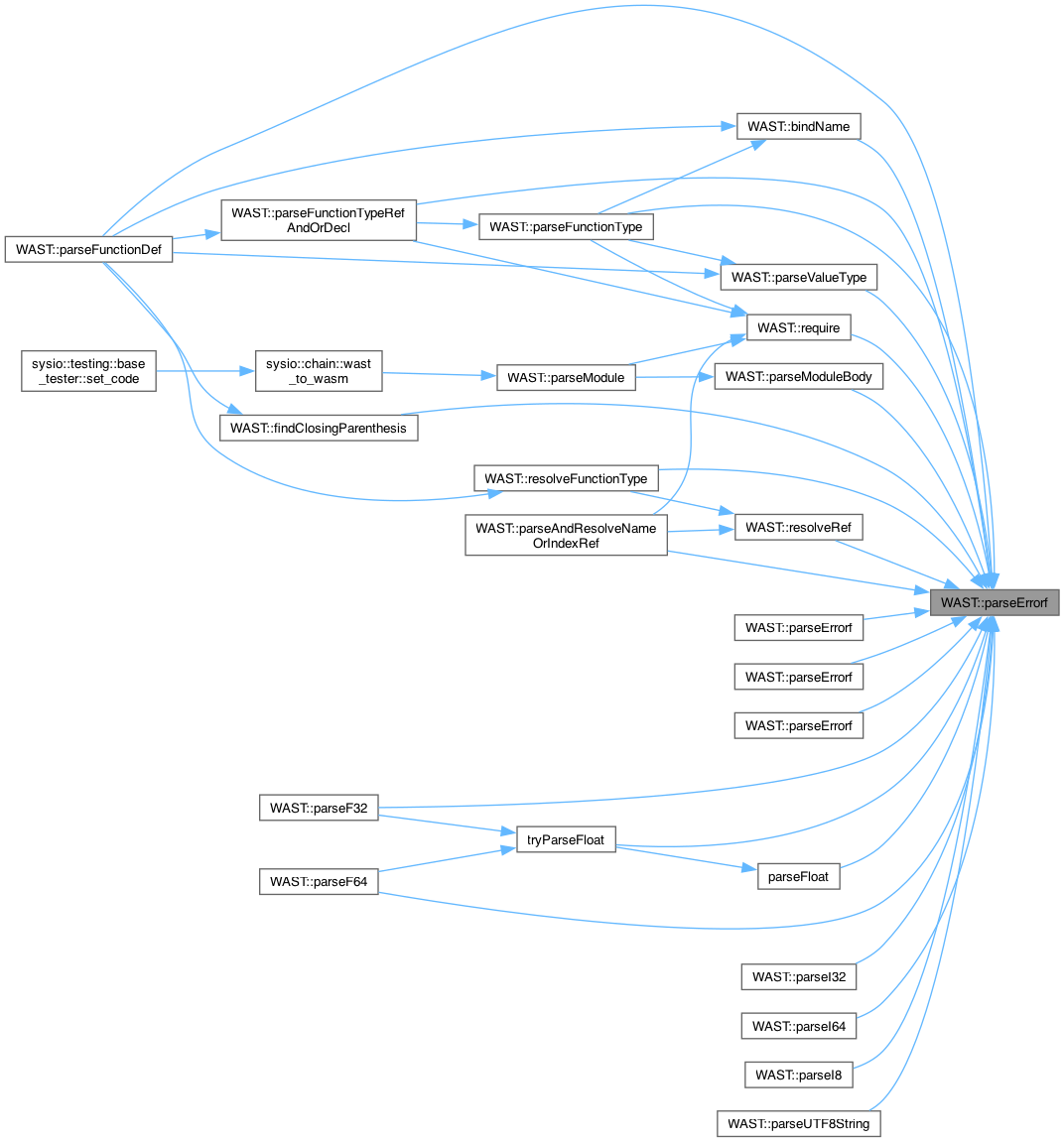
◆ parseErrorf() [4/4]
| void WAST::parseErrorf | ( | ParseState & | state, |
| Uptr | charOffset, | ||
| const char * | messageFormat, | ||
| ... ) |
◆ parseF32()
| F32 WAST::parseF32 | ( | ParseState & | state | ) |
Definition at line 320 of file ParseNumbers.cpp.

◆ parseF64()
| F64 WAST::parseF64 | ( | ParseState & | state | ) |
Definition at line 331 of file ParseNumbers.cpp.

◆ parseFunctionDef()
| FunctionDef WAST::parseFunctionDef | ( | ModuleParseState & | state, |
| const Token * | funcToken ) |
Definition at line 542 of file ParseFunction.cpp.
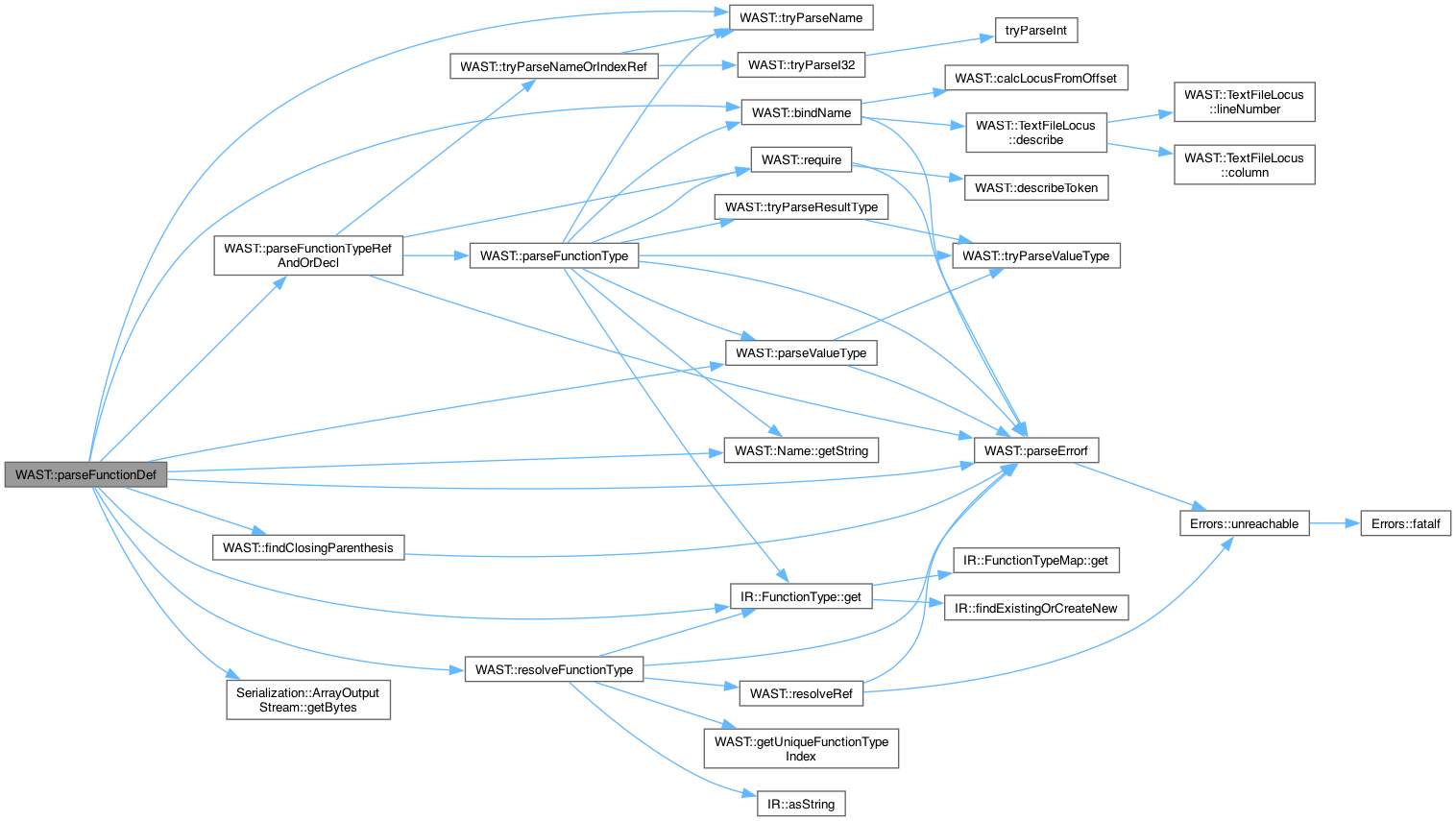
◆ parseFunctionType()
| const IR::FunctionType * WAST::parseFunctionType | ( | ModuleParseState & | state, |
| NameToIndexMap & | outLocalNameToIndexMap, | ||
| std::vector< std::string > & | outLocalDisassemblyNames ) |
Definition at line 121 of file Parse.cpp.
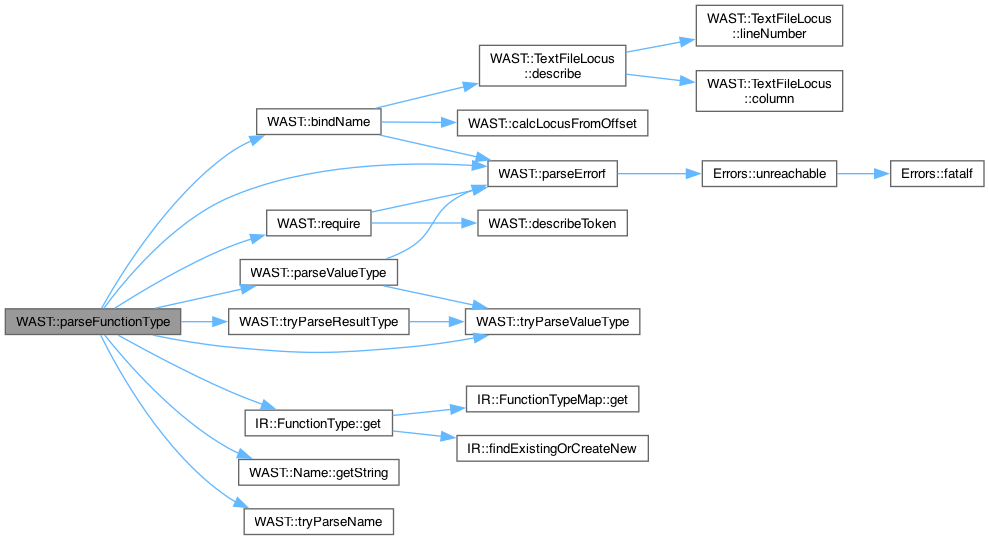

◆ parseFunctionTypeRefAndOrDecl()
| UnresolvedFunctionType WAST::parseFunctionTypeRefAndOrDecl | ( | ModuleParseState & | state, |
| NameToIndexMap & | outLocalNameToIndexMap, | ||
| std::vector< std::string > & | outLocalDisassemblyNames ) |
Definition at line 170 of file Parse.cpp.
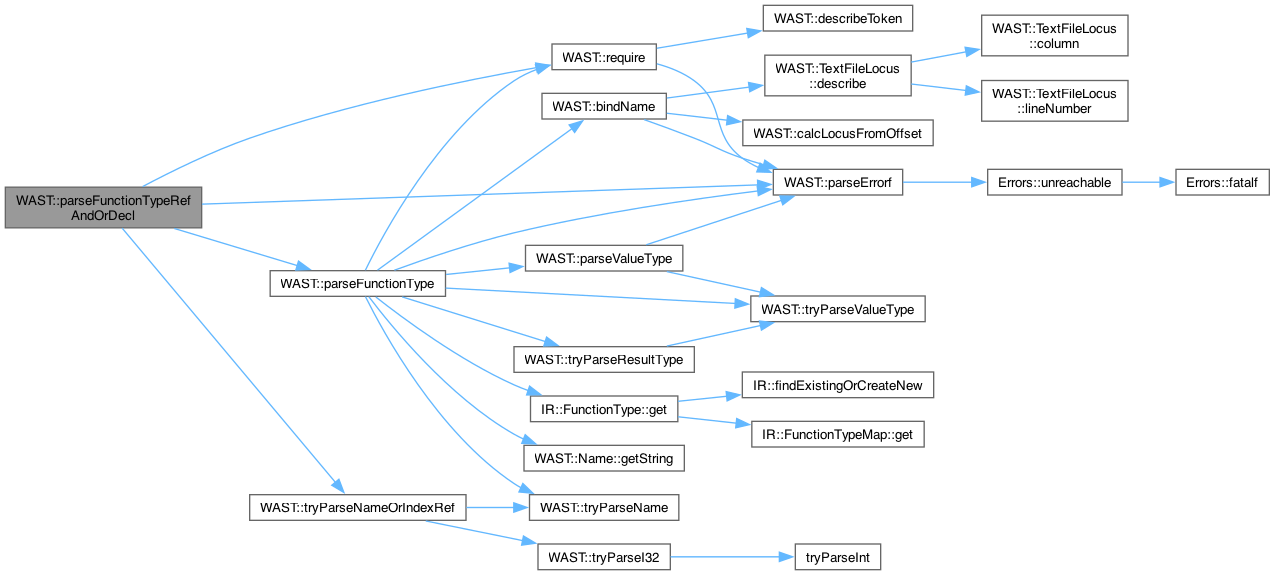

◆ parseI32()
| U32 WAST::parseI32 | ( | ParseState & | state | ) |
Definition at line 298 of file ParseNumbers.cpp.

◆ parseI64()
| U64 WAST::parseI64 | ( | ParseState & | state | ) |
Definition at line 309 of file ParseNumbers.cpp.

◆ parseI8()
| U8 WAST::parseI8 | ( | ParseState & | state | ) |
Definition at line 287 of file ParseNumbers.cpp.

◆ parseModule()
| bool WAST::parseModule | ( | const char * | string, |
| Uptr | stringLength, | ||
| IR::Module & | outModule, | ||
| std::vector< Error > & | outErrors ) |
Definition at line 638 of file ParseModule.cpp.
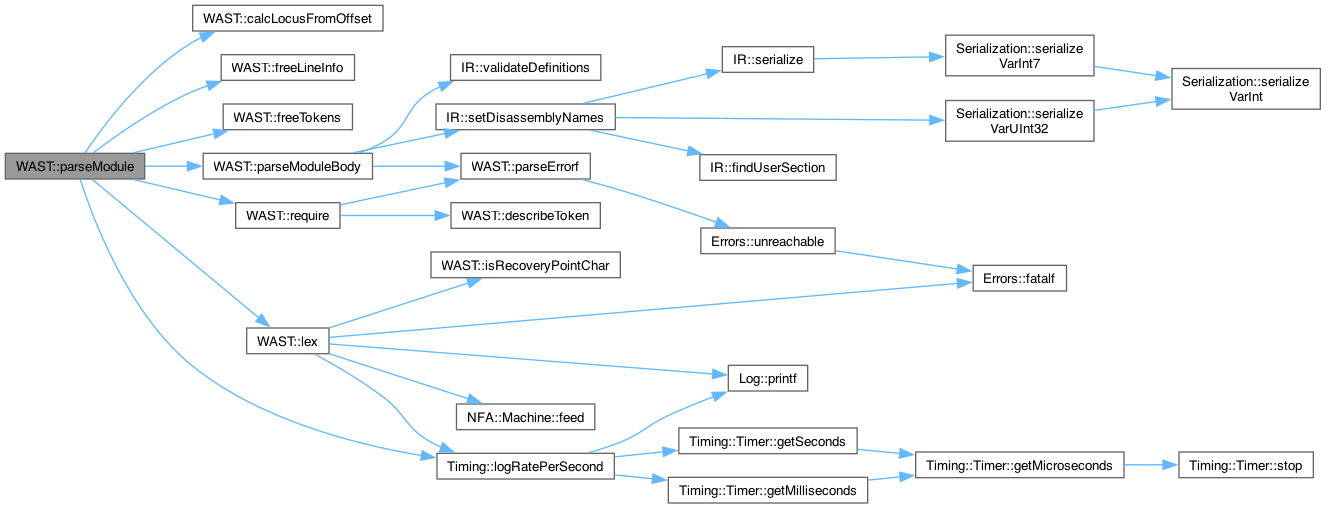

◆ parseModuleBody()
| void WAST::parseModuleBody | ( | ModuleParseState & | state | ) |
Definition at line 589 of file ParseModule.cpp.


◆ parseTestCommands()
| WAST_API void WAST::parseTestCommands | ( | const char * | string, |
| Uptr | stringLength, | ||
| std::vector< std::unique_ptr< Command > > & | outTestCommands, | ||
| std::vector< Error > & | outErrors ) |
◆ parseUTF8String()
| std::string WAST::parseUTF8String | ( | ParseState & | state | ) |
Definition at line 481 of file Parse.cpp.

◆ parseValueType()
| IR::ValueType WAST::parseValueType | ( | ParseState & | state | ) |
Definition at line 110 of file Parse.cpp.


◆ print() [1/8]
| std::string WAST::print | ( | const IR::Module & | module | ) |
Definition at line 687 of file Print.cpp.

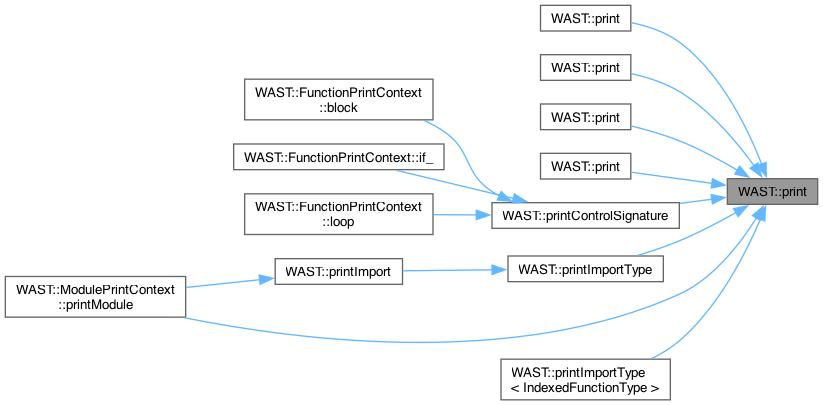
◆ print() [2/8]
| void WAST::print | ( | std::string & | string, |
| const FunctionType * | functionType ) |
Definition at line 91 of file Print.cpp.

◆ print() [3/8]
| void WAST::print | ( | std::string & | string, |
| const MemoryType & | type ) |
◆ print() [4/8]
| void WAST::print | ( | std::string & | string, |
| const SizeConstraints & | size ) |
◆ print() [5/8]
| void WAST::print | ( | std::string & | string, |
| const TableType & | type ) |
◆ print() [6/8]
| void WAST::print | ( | std::string & | string, |
| GlobalType | type ) |
◆ print() [7/8]
| void WAST::print | ( | std::string & | string, |
| ResultType | type ) |
◆ print() [8/8]
| void WAST::print | ( | std::string & | string, |
| ValueType | type ) |
◆ printControlSignature()
| void WAST::printControlSignature | ( | std::string & | string, |
| ResultType | resultType ) |
◆ printImport()
| void WAST::printImport | ( | std::string & | string, |
| const Module & | module, | ||
| const Import< Type > & | import, | ||
| Uptr | importIndex, | ||
| const char * | name, | ||
| const char * | typeTag ) |
Definition at line 460 of file Print.cpp.


◆ printImportType()
◆ printImportType< IndexedFunctionType >()
| void WAST::printImportType< IndexedFunctionType > | ( | std::string & | string, |
| const Module & | module, | ||
| IndexedFunctionType | type ) |
◆ require()
| void WAST::require | ( | ParseState & | state, |
| TokenType | type ) |
◆ resolveFunctionType()
| IR::IndexedFunctionType WAST::resolveFunctionType | ( | ModuleParseState & | state, |
| const UnresolvedFunctionType & | unresolvedType ) |
Definition at line 197 of file Parse.cpp.


◆ resolveRef()
| U32 WAST::resolveRef | ( | ParseState & | state, |
| const NameToIndexMap & | nameToIndexMap, | ||
| Uptr | maxIndex, | ||
| const Reference & | ref ) |
Definition at line 338 of file Parse.cpp.


◆ tryParseHexit()
| bool WAST::tryParseHexit | ( | const char *& | nextChar, |
| U8 & | outValue ) |
Definition at line 368 of file Parse.cpp.
◆ tryParseI32()
| bool WAST::tryParseI32 | ( | ParseState & | state, |
| U32 & | outI32 ) |
Definition at line 277 of file ParseNumbers.cpp.


◆ tryParseI64()
| bool WAST::tryParseI64 | ( | ParseState & | state, |
| U64 & | outI64 ) |
Definition at line 282 of file ParseNumbers.cpp.


◆ tryParseName()
| bool WAST::tryParseName | ( | ParseState & | state, |
| Name & | outName ) |
Definition at line 252 of file Parse.cpp.

◆ tryParseNameOrIndexRef()
| bool WAST::tryParseNameOrIndexRef | ( | ParseState & | state, |
| Reference & | outRef ) |
◆ tryParseResultType()
| bool WAST::tryParseResultType | ( | ParseState & | state, |
| ResultType & | outResultType ) |
◆ tryParseString()
| bool WAST::tryParseString | ( | ParseState & | state, |
| std::string & | outString ) |
Definition at line 448 of file Parse.cpp.

◆ tryParseValueType()
| bool WAST::tryParseValueType | ( | ParseState & | state, |
| ValueType & | outValueType ) |












